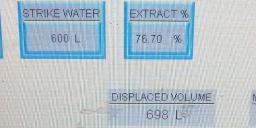Malt Loading For Mashing
I am all for making things simpler especially when trying to avoid another botch of my recent mash grain loading where I under provided. Yes, a ratio of 4L/Kg of strike water to malt will result in an approx. OG of 1.072.
In any case, I introduced an info calculation HMI screen for doing calculations for checking. Entering 3 inputs calculates total displaced volume together with required malt loading. Hopefully I wont make the mistake again.



image.jpg
800 x 245 - 51K
Tagged:

Comments
OG seems high, maybe I'm misinterpreting.
I'd imagine closer to 170-175kg to get to 1.072 with 600 liters of strike water.
Otherwise, 147kg made up to a total volume of 600l (500l strike water) would be close to 1.072.
Even with 77% extract efficiency.
That's based on the math I use for my grain-in process (no lauter), so it doesn't take into account things like water hold up in the grain, sparge, etc etc etc. It's just water+grain.
Never say never and I could be wrong. The extract for barley malt in SA, this calculator I got from a colleague, the "bearded brewer". So the two Excel parts (his and mine) are as shown below;
Ah ok you are assuming 100% mash efficiency.
I typically assume 80-85%, that’s the difference. I was assuming you meant efficiency not extract on that screen shot.
Here's the Excel formula (XLSX) for those that would like it. ..... Courtesy of the bearded brewer
Using trusted brewing software and 2 row barley (as I don't know which brand you are using) for 600L into fermenter and an efficiency of 75%, I calculate you need 186kg of malt to hit 1.072 & need 744L.
Using 147kg grain to hit 1.072 you'd end up with 470L into the fermenter and need 584L to hit 4l/kg.
No, it's 700L into fermenter as we are fermenting on the grain using pale barley malt. 600L is the strike water together with 150 Kg barley malt which gives a total of 700L displaced volume. The percentage extract drives the Kg malt required. This percentage extract selected is on the lower side of what can be entered. If I recall correctly, it can go up to about 78%. I will check with my source, the Bearded Brewer.
The extract percentage is specific to the malt, and it's typically something you'd find on the malt spec sheet. For a grain in distillery mash, the dry basis fine grind numbers are a good starting point. Typically it's around 80%, give or take. Keep in mind, you have husk, germ, etc - components of the grain that don't yield fermentable sugar - that's this.
However, mash efficiency still plays a role in the actual extract numbers. Fine grind, grain in, non-boil, glucoamylase fermentations will see higher overall mash efficiencies than coarse grind non-enzyme mashes, even if it's not so apparent in the starting gravity. Lots of other factors come into play. Do you have the ability to cook/heat? Is agitation sufficient? Is pH optimal for the enzyme? Are you maintaining appropriate time at temperature for conversion? How is your milling consistency? What's your grain moisture level? Do you have dough balls? Did you denature enzyme? Etc etc etc.
The two efficiency numbers stack on top of each other. Let's say you can achieve an 80% mash efficiency, and are using a malt with 80% extractability. That's 80% of 80%, so a real-world 64% (unlikely, this is pretty terrible, but not unrealistic for someone doing all-grain as a newbie).
Now, like I said, hammer mill grain-in distillery mashes are far better than 80%, especially if you are using exogenous enzyme. Probably closer to 95%. So that math is 95% of 80%, or 76% real world.
;) I'm a mechanical engineer and long in the tooth too ... so I leave this part to you.